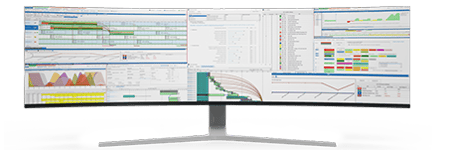Prioritizing Critical Tasks for Production Planners in Chemical Manufacturing
Production Planners constantly face the challenge of juggling numerous tasks to keep production on track, costs controlled, and quality high. From managing the flow of raw materials and maintaining regulatory compliance to ensuring operational safety, there’s a lot at stake.
To meet these demands, Production Planners need a system that helps them identify, prioritize, and execute critical tasks with precision and agility. Integrating advanced production planning solutions like PlanetTogether with established ERP systems such as SAP, Oracle, Microsoft, Kinaxis, or Aveva provides planners with the capabilities they need to streamline priorities and ensure that the most vital operations stay on target.
This blog explores how a well-integrated planning approach can empower Production Planners in the chemical manufacturing industry to prioritize critical tasks effectively, reduce downtime, and adapt more fluidly to changes in demand and production requirements.

The Critical Nature of Task Prioritization in Chemical Manufacturing
Chemical manufacturing is a complex industry where timing and prioritization are paramount. Unlike other sectors, chemical production processes often involve intricate, multi-step workflows that must be synchronized. Missing a step or delaying a key task can cause ripple effects that may compromise safety, product quality, and profitability. A few examples of critical tasks that demand constant oversight include:
Material Management – Ensuring the right raw materials are available at the right time, in the correct quantities, to avoid production halts.
Quality Control – Testing and monitoring to maintain regulatory standards.
Safety Compliance – Handling hazardous materials according to strict safety protocols.
Equipment Maintenance – Scheduling preventive maintenance to avoid unexpected breakdowns.
Each of these areas demands immediate attention, and without prioritizing them, production could be interrupted, leading to costly delays and potential regulatory fines.

The Challenge of Manual Prioritization and Its Limitations
Traditionally, many Production Planners rely on manual prioritization or spreadsheets to monitor and track these tasks. While this may have worked in simpler times, it’s no longer viable. Manual tracking can lead to a lack of real-time visibility, inadequate reporting, and inefficient communication across departments. Without automation and integration, it’s nearly impossible for planners to respond to urgent issues as they arise or to prioritize effectively based on real-time data.
In today’s environment, Production Planners require a more robust, connected approach. Here’s where PlanetTogether and ERP integration with SAP, Oracle, Microsoft, Kinaxis, or Aveva come into play.
![]()

PlanetTogether and ERP Integration: A Holistic Approach to Prioritization
PlanetTogether is an advanced planning and scheduling (APS) software that allows manufacturers to manage their production schedules with precision. When integrated with an ERP system like SAP or Oracle, PlanetTogether provides enhanced visibility into both operational and supply chain aspects of production, creating a seamless flow of data across the organization. This integration allows Production Planners to view real-time data on inventory, demand forecasts, equipment status, and workforce availability – all in one place. Let’s explore the core benefits this integration brings to task prioritization.
Real-Time Inventory and Material Tracking
Integrated with ERP systems, PlanetTogether enables planners to track raw materials in real-time, helping them prioritize material allocation for critical tasks. For instance, if a high-priority batch requires a specific raw material, planners can verify its availability immediately. If stock levels are low, they’re alerted early enough to prevent delays, and they can adjust their schedules accordingly to accommodate incoming materials.
This integration is especially critical in chemical manufacturing, where certain materials may be subject to regulatory approvals or have limited shelf lives. Real-time data visibility allows planners to allocate these sensitive resources to high-priority tasks and avoid wastage.
Optimized Production Scheduling
Production schedules in chemical manufacturing are intricate and require tight coordination to ensure each stage flows smoothly. With PlanetTogether integrated into an ERP platform like SAP or Kinaxis, planners can optimize their schedules based on live data. This capability means that when a critical order comes in or a priority shift occurs, the system can automatically adjust schedules, reallocate resources, and notify relevant team members to keep production aligned with top priorities.
Additionally, PlanetTogether’s APS capabilities allow planners to simulate different scheduling scenarios and determine which will best meet demand without compromising quality or safety. This proactive approach helps planners avoid overburdening the workforce and ensure that critical tasks are given precedence.
Automated Quality and Compliance Checks
Quality control and compliance are crucial in chemical manufacturing. Integrated systems can automate many aspects of quality assurance, from tracking test results to flagging issues when quality falls below acceptable thresholds. With PlanetTogether and ERP integration, planners can set quality control tasks as high-priority, ensuring that these checks happen at critical points in the production cycle.
For example, if the ERP system detects that a batch may be approaching an expiration or contamination risk, PlanetTogether can reschedule the necessary tests or allocate additional quality control resources. This automated approach reduces the risk of human error and ensures that critical quality checks aren’t overlooked, thus maintaining the compliance and safety standards essential in chemical manufacturing.
Predictive Maintenance and Asset Management
Downtime is the enemy of efficiency, especially in chemical manufacturing where equipment breakdowns can disrupt entire production lines. With the integration of PlanetTogether and ERPs like Aveva, planners have access to predictive maintenance tools that forecast potential equipment issues before they arise.
The ERP system continuously monitors machine data, and when anomalies are detected, PlanetTogether can automatically adjust schedules to accommodate preventive maintenance. This prioritization minimizes the risk of unplanned downtime and allows planners to allocate resources to tasks that will keep operations running smoothly, even when maintenance is required. This capability is especially valuable in a high-stakes environment like chemical manufacturing, where downtime directly impacts both productivity and profitability.
Enhanced Communication and Collaboration
One of the less obvious but profoundly impactful benefits of an integrated planning system is the improved communication it fosters across departments. Production Planners need to coordinate with procurement, quality control, and logistics teams to ensure critical tasks are aligned with organizational goals. PlanetTogether and ERP integration creates a single source of truth, where all departments can access real-time data and updates on production status.
For example, if a key raw material is delayed, this information is visible across the system, allowing planners to adjust task priorities, reschedule production if necessary, and communicate the changes to stakeholders immediately. This collaborative environment reduces silos, ensures everyone is on the same page, and allows planners to prioritize tasks in a way that aligns with company objectives.

Implementing a Prioritization Framework: Best Practices for Production Planners
Integrating PlanetTogether with ERP systems is a powerful step toward more effective prioritization, but to fully leverage this setup, Production Planners should establish a structured prioritization framework. Here are some best practices to follow:
Define Priority Levels – Establish clear criteria for what constitutes high, medium, and low priority tasks. For instance, tasks directly impacting regulatory compliance, safety, or critical supply chain links should always be high priority.
Use Real-Time Data to Inform Decisions – Prioritization should be a dynamic process that adjusts based on real-time data from PlanetTogether and ERP integration. Continually monitor key performance indicators (KPIs) and update priorities as circumstances change.
Leverage Predictive Insights – Use predictive data from integrated systems to anticipate potential issues. If maintenance is likely to be needed soon on a critical machine, schedule tasks around this need to prevent production interruptions.
Establish Communication Protocols – Develop protocols for notifying relevant team members when priority shifts occur. This ensures that everyone is aware of changes and can contribute to resolving high-priority issues promptly.
Regularly Review and Adjust the Prioritization Process – Chemical manufacturing is subject to fluctuating demand, supply chain disruptions, and regulatory updates. Regularly review your prioritization process to ensure it remains aligned with current business conditions.
For Production Planners in chemical manufacturing, the ability to prioritize critical tasks effectively is no longer optional; it’s a necessity. Integrating PlanetTogether with ERP systems like SAP, Oracle, Microsoft, Kinaxis, or Aveva empowers planners to respond quickly to evolving priorities, anticipate potential bottlenecks, and streamline communication across teams. This integrated approach not only reduces production risks but also provides a competitive advantage by enabling faster response times, improved quality control, and more efficient resource utilization.
In a sector where every second counts, the ability to seamlessly integrate production planning with broader enterprise data opens up new possibilities for enhanced productivity and strategic growth. For chemical manufacturers, embracing this integration is a significant step forward in optimizing operations and ensuring that every critical task is handled with the priority it deserves.
Are you ready to take your manufacturing operations to the next level? Contact us today to learn more about how PlanetTogether can help you achieve your goals and drive success in your industry.
Topics: Quality Control, PlanetTogether Software, Integrating PlanetTogether, Optimized Production Scheduling, Enhanced Communication and Collaboration, Chemical Manufacturing, Automated Quality and Compliance Checks, Predictive Maintenance and Asset Management, Real-Time Inventory and Material Tracking




















LEAVE A COMMENT